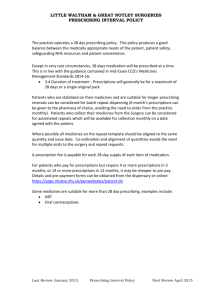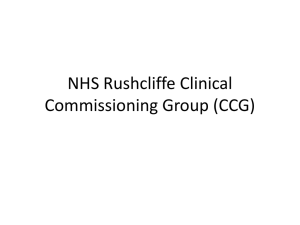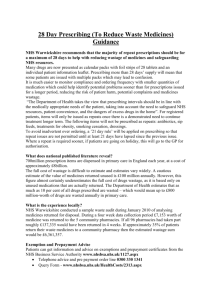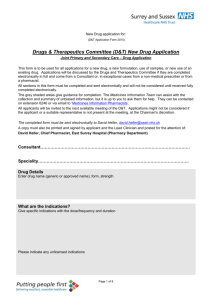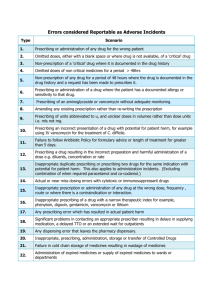28 Day Prescribing Policy
advertisement
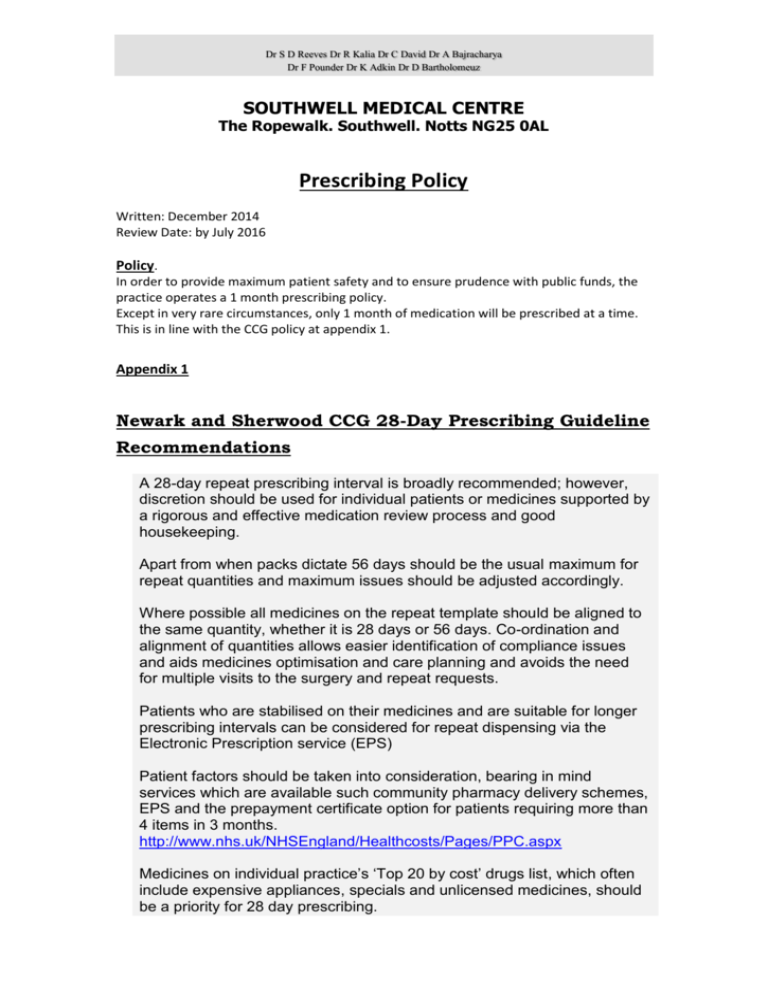
Dr S D Reeves Dr R Kalia Dr C David Dr A Bajracharya Dr F Pounder Dr K Adkin Dr D Bartholomeuz SOUTHWELL MEDICAL CENTRE The Ropewalk. Southwell. Notts NG25 0AL Prescribing Policy Written: December 2014 Review Date: by July 2016 Policy. In order to provide maximum patient safety and to ensure prudence with public funds, the practice operates a 1 month prescribing policy. Except in very rare circumstances, only 1 month of medication will be prescribed at a time. This is in line with the CCG policy at appendix 1. Appendix 1 Newark and Sherwood CCG 28-Day Prescribing Guideline Recommendations A 28-day repeat prescribing interval is broadly recommended; however, discretion should be used for individual patients or medicines supported by a rigorous and effective medication review process and good housekeeping. Apart from when packs dictate 56 days should be the usual maximum for repeat quantities and maximum issues should be adjusted accordingly. Where possible all medicines on the repeat template should be aligned to the same quantity, whether it is 28 days or 56 days. Co-ordination and alignment of quantities allows easier identification of compliance issues and aids medicines optimisation and care planning and avoids the need for multiple visits to the surgery and repeat requests. Patients who are stabilised on their medicines and are suitable for longer prescribing intervals can be considered for repeat dispensing via the Electronic Prescription service (EPS) Patient factors should be taken into consideration, bearing in mind services which are available such community pharmacy delivery schemes, EPS and the prepayment certificate option for patients requiring more than 4 items in 3 months. http://www.nhs.uk/NHSEngland/Healthcosts/Pages/PPC.aspx Medicines on individual practice’s ‘Top 20 by cost’ drugs list, which often include expensive appliances, specials and unlicensed medicines, should be a priority for 28 day prescribing. Prescribers should consider a flexible approach when initiating a medicine; a shorter interval (7–14 days) may be recommended or appropriate initially to assess tolerability and compliance. The National Health Service spends £8 billion a year on prescription drugs in primary care in England and trying to control the inevitable wastage of medicines is a primary concern. Nationally, repeat prescribing accounts for 60-70% by cost and 80% by volume of prescriptions in the UK (1) 28-day prescription durations have been used as a means to reduce wastage but the opposing views from patients and health care professionals make a case for increased dispensing fees, workload and reduced access. There is a need to reduce the amount of medicines that are sent away to be incinerated using a patient centred approach by ensuring that we have robust repeat prescribing and dispensing systems and regular quality medication reviews to ensure medicine optimisation and to minimise the reduced health outcomes that result from people not taking their medicines as intended The following additional benefits can be gained from 28 days prescribing as well as the reduction in medicines incinerated. Many medicines are now packaged in 28 or 30-day packs and large quantities in multiple packs can lead to confusion, particularly in the elderly and result in duplicated doses. Prescribing 28 days ensures that the patient generally only receives one pack of tablets. Prescriptions issued on a 28-day basis do not always necessitate an appointment with a GP, but it does give the patient regular contact with a healthcare professional where they can raise any problems or concerns. A 28 day supply of medication produces a good balance between patient convenience and risk of wastage for patients with unstable medical conditions and at risk of admission. Some medicines are suitable for more than 28 day prescribing, examples include: HRT Oral contraceptives Some medicines should where possible only be prescribed for 28 days, examples include: Controlled drugs Drugs prescribed for palliative care High cost medicines including appliances, Dressings Antipsychotic medicines and hypnotics Medicines prescribed in Care Home The Department of Health takes the view that prescribing intervals should be in line with the medically appropriate needs of the patient, taking into account the need to safeguard NHS resources, patient convenience, and the dangers of excess drugs in the home (3) References 1. Improving the use of medicines for better outcomes and reduced waste. An action plan October 2012 https://www.gov.uk/government/uploads/system/uploads/att achment_data/file/212837/Improving-the-use-of-medicines-forbetter-outcomes-and-reduced-waste-An-action-plan.pdf 2. All Wales Review and Guidance for Prescribing Intervals February 2013 http://www.awmsg.org/docs/awmsg/medman/All%20Wales%2 0Review%20and%20Guidance%20for%20Prescribing%20Interva ls.pdf 3. Prescribing in general practice: General practitioners committee. May 2013 http://bma.org.uk/practical-support-at-work/gppractices/prescribing
